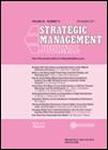-
作者:Bromiley, Philip
作者单位:University of California System; University of California Irvine
摘要:This paper demonstrates that prospect theory's (PT) predictions differ dramatically from what strategy scholars have inferred. PT's value function predicts negative risk-return associations for high performers and positive for low performers, directly contrary to the strategy literature. In addition, PT's isolation assumption means most firm choices should appear as mixed gambles. Prior PT-based theorizing in strategy implicitly assumed that the firm faced unmixed gambles. Finally, it demonstr...
-
作者:Holburn, Guy L. F.; Zelner, Bennet A.
作者单位:Duke University; Western University (University of Western Ontario)
摘要:Whereas conventional wisdom holds that multinational enterprises (MNEs) invest less in host countries that pose greater policy risk-the risk that a government will opportunistically alter policies to expropriate an investing firm's profits or assets-we argue that MNEs vary in their response to host-country policy risk as a result of differences in organizational capabilities for assessing such risk and managing the policy-making process. We hypothesize that firms from home countries characteri...
-
作者:Gruber, Marc; Heinemann, Florian; Brettel, Malte; Hungeling, Stephan
作者单位:Swiss Federal Institutes of Technology Domain; Ecole Polytechnique Federale de Lausanne; RWTH Aachen University
摘要:As one of the most widely accepted theoretical perspectives in strategy, the resource-based view (RBV) suggests that a firm's resources underlie its ability to achieve competitive advantage. However, much of the extant work in this stream has examined the characteristics that resources must have in order to yield rents, while efforts to specify the crucial link between resources and value creation have been sparse. As a consequence, current theory is not sufficiently clear on how different kin...
-
作者:Arikan, Asli M.; Capron, Laurence
作者单位:University System of Georgia; Georgia State University; INSEAD Business School
摘要:We examine whether pre-IPO affiliations affect post-IPO corporate events, namely acquisitions. On the one hand, newly public acquirers may benefit from their pre-IPO affiliations through residual signaling value or/and resource-related benefits. On the other hand, newly public acquirers may suffer from those affiliations when conflicts of interests arise during the post-IPO period. Equity underwriters may have incentive to promote non-value-creating acquisitions (Type II error), and venture ca...


